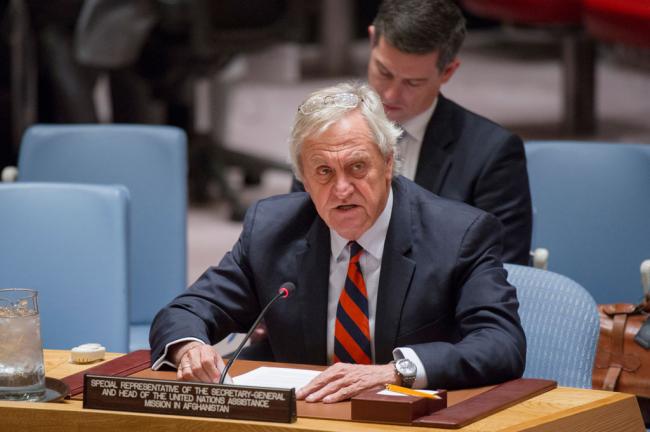
Despite progress, Afghanistan faces major economic, security and political challenges in 2016 - UN envoy
“In 2016, it is vital that the National Unity Government demonstrates increasingly its effectiveness, not only to the Afghan people but also donors, on whom it is largely dependent for financial, material and technical assistance,” Secretary-General Ban Ki-moon’s Special Representative for Afghanistan Nicholas Haysom told the Security Council.
He stressed that many Afghans are anxious about the future, with some feeling they have no choice other than to leave the country in search of security and economic opportunity elsewhere.
“Civilians, as ever, continue to bear the brunt of the conflict, as casualties rise at an ever increasing pace and more people have been displaced from their homes by the conflict,” he said, stressing that with the fiscal gap between revenue raised and spent, poverty is no less prevalent, economic contraction has led to high unemployment, and corruption has yet to be overcome,” he said.
While challenges of such a scale and complexity would test any Government, however, there has been progress on reforming the civil service and electoral sector, economic growth though low is projected to increase in the next years, and Afghan security forces (ANSF) have shown resilience in the face of an intensified insurgency, he noted.
Haysom commended the Government for continuing to put into place the building blocks for long-term economic improvement, including through regional integration, and he noted that while the temporary loss of key district and provincial centres like Kunduz revealed major ANSF shortcomings, almost all of these centres have been retaken.
“The ANSF may be stretched to capacity but, for the most part, they are holding their ground,” he said.
“This does not ignore the need for improvements to ANSF functioning, with a particular focus on logistics and administration, and remedial measures to boost both morale and diminish rates of attrition, as well as continued international support for its attempts to build its own air support capabilities.”
Haysom highlighted the need to tackle corruption and make governance reform to reassure the international community that its aid will have a tangible impact in 2016, with the North Atlantic Treaty Organization (NATO) meeting in Warsaw to pledge its military commitment for four years, while in Brussels donors will recommit to civilian aid.
“UNAMA will be encouraging donors to invest in Afghanistan's reconstruction and security, rather than bear the costs of immigration,” he said, referring to the UN Assistance Mission in Afghanistan, which he heads.
“This situation cannot continue indefinitely – sooner or later the financial resources currently available to the country will decrease. Afghanistan needs to find a political route to peace,” he added, calling on the Taliban to commit to entering into a peace process as the Government has.
He pledged that during 2016 UNAMA will continue to pursue its three track approach to engagement with the Taliban - on human rights, humanitarian access and on political engagement.
UN Photo/Rick Bajornas
Support Our Journalism
We cannot do without you.. your contribution supports unbiased journalism
IBNS is not driven by any ism- not wokeism, not racism, not skewed secularism, not hyper right-wing or left liberal ideals, nor by any hardline religious beliefs or hyper nationalism. We want to serve you good old objective news, as they are. We do not judge or preach. We let people decide for themselves. We only try to present factual and well-sourced news.







